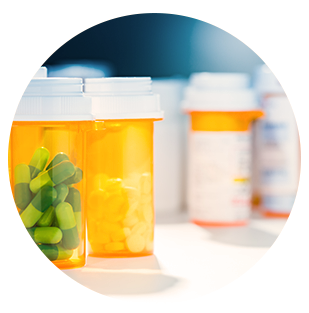One of the most common myths about prescription drug abuse is that prescribed medications are completely safe. Although this is mostly true when taken as directed, many medications have the potential for abuse. Medications like opioids, benzodiazepines, and stimulants can each lead to addiction if heavily misused. A person may abuse their prescription medications by taking higher doses than directed, mixing them with other drugs or alcohol, or taking them in ways they shouldn’t (such as crushing or snorting them). For those who have developed an addiction to their prescription medications, our prescription drug rehab in Delaware offers the help needed to attain long-term sobriety.

Signs of Prescription Drug Abuse
Prescription drug abuse is defined as the use of prescription medication in a way not intended by the prescribing doctor. This includes everything from taking a friend’s or family member’s prescription painkiller to crushing pills and snorting or injecting them to get high.
There’s been an increasing problem of prescription drug abuse in the United States, especially since the late 1990s when opioid prescriptions skyrocketed. Since then, thousands of people have been impacted by prescription drug abuse, mainly in the form of opioids.
Early detection and prescription pill addiction treatment are crucial for long-term recovery. Although the signs and symptoms of prescription drug abuse vary depending on the substance in question, they typically include:
- Constipation
- Nausea and/or vomiting
- Feeling high (euphoria)
- Drowsiness
- Slurred speech
- Dilated or constricted pupils
- Increased dose required for relief from symptoms
- Worsening or increased sensitivity to pain with higher doses (hyperalgesia)
- Drowsiness
- Confusion
- Lack of coordination
- Poor concentration
- Dizziness
- Slowed breathing
- Problems with memory
- Increased alertness
- Irregular heart rate
- High blood pressure
- High body temperature
- Reduced appetite
- Insomnia
- Agitation
- Anxiety and paranoia
The severity of symptoms may also depend on the extent of the person’s drug use. Some people can remain high functioning in the early stages of addiction, meaning they can hold down a job and carry on with their responsibilities at home.
Eventually, however, the impact of the drug on their physical and mental health will become more evident. With prescription drug addiction also comes the risk of overdose.
As time passes, a person who abuses medications like benzos, opioids, or stimulants chronically will grow more physically tolerant and dependent on them. Often, overdose occurs because the person is taking a higher dose to experience desired side effects. In the end, this can lead to a potentially fatal overdose.
If you or someone you know is showing signs of an addiction to prescription medications, our prescription drug rehab in Delaware offers various programs that address the physical, mental, and social impact of addiction to help patients and their loved ones regain their health and their lives.
Our Treatment for Addiction to Prescription Drugs
Prescription drug addiction treatment centers are designed to help people physically recover from withdrawal and mentally recover from drug dependence. A substance use disorder is both physical and psychological, so prescription pill rehab centers should offer all levels of care to reduce the likelihood of relapse.
With that said, our prescription drug abuse programs are well-rounded modalities led by experts in the addiction treatment field to ensure that clients are guided through every step of their recovery. Normally, the first step of treatment is our prescription drug detox.
Our medical detox in Delaware is crucial for assisting clients in safely withdrawing from drugs. Opioids are especially difficult substances to detox from, which is why we have a medical team that supervises withdrawal treatment to ensure that patients are as safe and comfortable as possible.
After detox then comes the therapeutic and counseling aspect of our prescription medication rehab programs. Once we’ve addressed the physical challenges of recovery, we can then help patients identify the source of their addictions, potential relapse triggers, and also teach them how to adapt their day-to-day lives to their newfound sobriety.
Because drug addiction not only affects the individual but the people they're closest to, our prescription drug rehab in Delaware also offers family therapy. Having a strong support system at home can make a huge difference in a person’s recovery from addiction, which is why we have counselors at our Milford treatment center that promote healing among clients and their families.
Contact Us Today
You don’t have to live with addiction. No matter how long you’ve used drugs or alcohol, recovery is possible. Contact Banyan Delaware today to learn more about the levels of substance abuse treatment offered at our Milford rehab.
Related Reading:
Most Dangerous Prescription Drugs
How Benzos Affect the Brain
The Truth About Opioid Overdose Brain Damage
Most Insurance Plans Accepted
At Banyan Treatment Centers, our goal is to make sure that anyone who needs treatment from drug and alcohol addiction are able to get the help needed to assist them on the road to recovery. If you don't have insurance contact us to inquire about alternate methods regarding treatment for yourself or a loved one.










